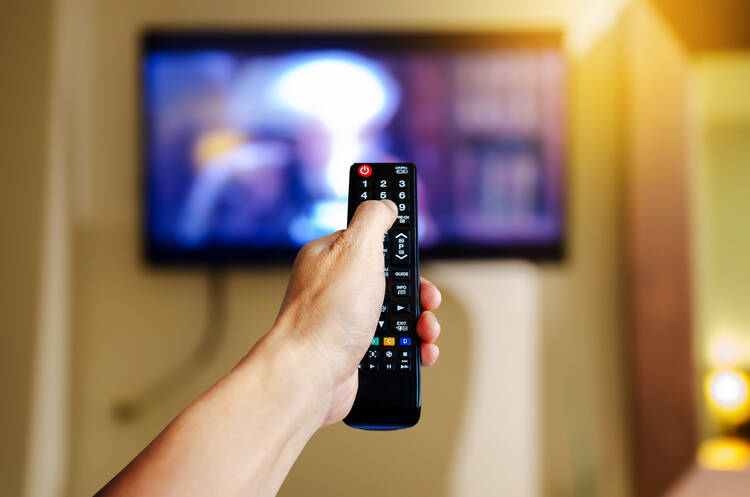Listen to this story re-imagined with interviews, sound design and commentary from America’s editors on the "Church Meets World" podcast.
During the Covid pandemic, my young children discovered “The Jetsons,” thanks to a meme suggesting that the futuristic TV cartoon from the 1960s was “more accurate than expected” (see online yoga, virtual doctor visits, etc.). While the show’s prescience is fun to consider, it is more revealing to see how it missed the mark.
Among these miscalculations, none is as striking as the show’s vision of free time, one area where it actually underestimated the effects of technology. Like many of their contemporaries, the creators of “The Jetsons” imagined that technology would be a boon for recreation: We would shift our most time-consuming chores to machines and gain time to enjoy with families and friends. What they failed to appreciate is that we would not confine our technological advances to eliminating work. Instead, we have also embraced technology during our leisure time and ended up farther apart from each other.
But the “Jetsons” creators would have been familiar with the main culprit: television.
Across almost every demographic group, watching TV or streaming video is by far the most common leisure activity, according to the American Time Use Survey. The effects of this dominance over recreational time have been dramatic, and mostly negative, on both a personal and a social level.
There is nothing inherently wrong with using one’s free time to watch TV. Television is an effective means of relaxation, and there can be some self-care in a judicious use of this technology. The problem is that the benefits of television amount to a mere sliver of all the goods that free time can offer. When it becomes our default pastime, it leaves leisure’s true potential unrealized in our lives.
The benefits of television amount to a mere sliver of all the goods that free time can offer. When it becomes our default pastime, it leaves leisure’s true potential unrealized.
Television is an intrinsically passive medium, which means it can never generate what psychologists deem an “optimal experience”—the state of enjoyment that emerges when an activity perfectly balances our skills with the challenges of the task at hand. Worse, watching TV not only prevents us from achieving this optimal state in the moment but can leave us less interested in finding a pathway to it once the screen is off. Television thus colonizes our free time, leaving little room for the truly fulfilling pursuits that leisure can afford in other circumstances.
This is not the only cost television inflicts on free time. Beyond optimal experience, one of the greatest benefits of free time is its ability to foster relational connection. Unlike other contexts, in which our relationships are always at risk of being reduced to their utility, leisure lets us simply be with one another. We need no pretense to enjoy someone’s company when we are at rest together.
When we are watching TV, we are not socializing, even though we may be in the same room.
But when we are watching TV, we are not socializing, even though we may be in the same room. Given that, by one estimate, the average couple in the United States talks together for less than a third of the amount of time they spend watching TV, it is not hard to see how this technological intrusion harms relationships.
Television also has an insidious effect on civic engagement. People who report that TV is their primary form of entertainment have fewer interactions with their friends and are less likely to be involved in community organizations. As the sociologist Robert Putnam chronicled in Bowling Alone, television has torn at the very fabric of our common life.
It does not have to be this way. If we reclaim our identity as human beings made in the likeness of a relational God, we can come closer to the goodness that free time has to offer. The first step is to think about the relationships we would like to cultivate during our free time. Consistent with the Thomistic ordering of charity, I like to think about a weekly leisure examen that allows me to assess whether I have made time for God, time for self and time for others. In each case, I search for moments of optimal engagement, where I value the relationship for its own sake and not some extrinsic reward.
The next step is to challenge the structural factors that limit free time and make television so appealing. Major changes in the sphere of work, from the living minimum wage advocated by Catholic social teaching to guaranteed vacations and paid parental leave, could give us all more time to spend nurturing our relationships. Greater investment in shared leisure resources, like public parks and civic museums, could make alternatives to television more accessible. If we view good leisure as a shared responsibility, free time can be an occasion for solidarity, and thus a route to our own flourishing. All we need to do is turn away from technology and toward each other.
Personally, I can start by turning off “The Jetsons.”









